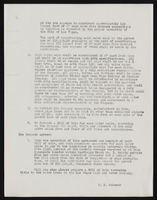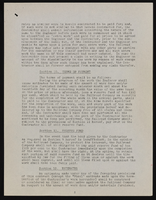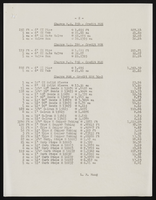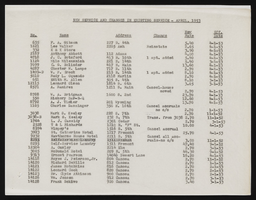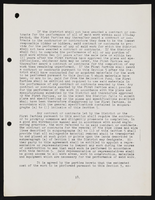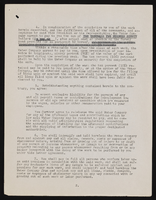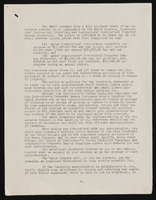Search the Special Collections and Archives Portal
Search Results


Barker Motel Neon Survey document, September 8, 2017
Date
2017-09-08
Archival Collection
Description
Information about the Barker Motel sign that sits at 2600 N Las Vegas Blvd.
Site address: 2600 N Las Vegas Blvd
Sign owner: Barker LLC
Sign details: 0.21 acre lot constructed in 1954. Property is closed.
Sign condition: 2- the sign is faded and neon has fallen off, as well as the majority of their original sign was taken down or weathered away
Sign form: Directional sign on top of building
Sign-specific description: The property has a tower which has a sign on top of it that is a peach colored arrow that has dark brown block lettering stating "MOTEL" that points towards the entrance of the parking lot of the motel. This end of the arrow has a steel support that goes to the first story of the building. This portion looks like it used to have skeletal neon but has fallen off. Near the road where this motel is located it looks as though there was once a sign because there is remnants of what the base of the sign was but no graphics on it.
Sign - type of display: Neon
Sign - media: Steel
Sign environment: Located in North Las Vegas, close to Jerry's Nugget Casino
Sign - date of redesign/move: Appears there are remnants of their original sign on the roadside, but the letters has been removed. It has been this way since at least 2010.
Sign - thematic influences: The arrow stating Motel is a 1950's/60's motel trend within the car consumer era and era of traveling to draw attention for people that are driving by.
Survey - research locations: Assessor's website
Survey - research notes: http://stefanidrivesvegas.com/12.html Stefani drives Vegas has images of before/after of this motel with an image that they date circa 1960
Surveyor: Emily Fellmer
Survey - date completed: 2017-09-08
Sign keywords: Neon; Steel; Directional; Paint
Site address: 2600 N Las Vegas Blvd
Sign owner: Barker LLC
Sign details: 0.21 acre lot constructed in 1954. Property is closed.
Sign condition: 2- the sign is faded and neon has fallen off, as well as the majority of their original sign was taken down or weathered away
Sign form: Directional sign on top of building
Sign-specific description: The property has a tower which has a sign on top of it that is a peach colored arrow that has dark brown block lettering stating "MOTEL" that points towards the entrance of the parking lot of the motel. This end of the arrow has a steel support that goes to the first story of the building. This portion looks like it used to have skeletal neon but has fallen off. Near the road where this motel is located it looks as though there was once a sign because there is remnants of what the base of the sign was but no graphics on it.
Sign - type of display: Neon
Sign - media: Steel
Sign environment: Located in North Las Vegas, close to Jerry's Nugget Casino
Sign - date of redesign/move: Appears there are remnants of their original sign on the roadside, but the letters has been removed. It has been this way since at least 2010.
Sign - thematic influences: The arrow stating Motel is a 1950's/60's motel trend within the car consumer era and era of traveling to draw attention for people that are driving by.
Survey - research locations: Assessor's website
Survey - research notes: http://stefanidrivesvegas.com/12.html Stefani drives Vegas has images of before/after of this motel with an image that they date circa 1960
Surveyor: Emily Fellmer
Survey - date completed: 2017-09-08
Sign keywords: Neon; Steel; Directional; Paint
Text
Pagination
Refine my results
Content Type
Creator or Contributor
Subject
Archival Collection
Digital Project
Resource Type
Year
Material Type
Place
Language
Records Classification


